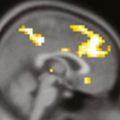Abstract
Criminal convictions require proof that a prohibited act was performed in a statutorily specified mental state. Different legal consequences, including greater punishments, are mandated for those who act in a state of knowledge, compared with a state of recklessness. Existing research, however, suggests people have trouble classifying defendants as knowing, rather than reckless, even when instructed on the relevant legal criteria. We used a machine-learning technique on brain imaging data to predict, with high accuracy, which mental state our participants were in. This predictive ability depended on both the magnitude of the risks and the amount of information about those risks possessed by the participants. Our results provide neural evidence of a detectable difference in the mental state of knowledge in contrast to recklessness and suggest, as a proof of principle, the possibility of inferring from brain data in which legally relevant category a person belongs. Some potential legal implications of this result are discussed.
